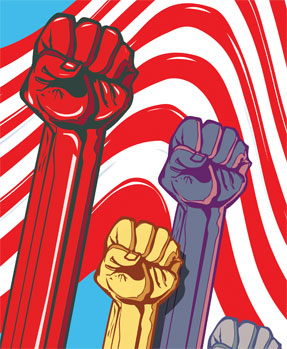Magazine
The New Socialists

No hammer and sickle flags may flutter on poles and no busts of Marx and Lenin may be erected in our public squares, but we are rapidly embracing the Marxist ideals of social equality
| Newsweek’s Feb 16 cover declared, “We are all socialists now.”
The magazine’s headline is more a recognition of reality than a pronouncement of a dogma or a philosophy. For the past several months, the U.S. economy has drifted toward greater government controls and restrictions on unbridled capitalism, the signature creed of this nation as far as one can remember. As the editors of Newsweek note, the great (and sweet) irony of this tectonic shift is that it began under a Republican administration and an arch conservative one at that, if we take the words of former Pres. George W. Bush on face value, no doubt a highly dubious assumption.
The country’s major banks have, for all practical purposes, been nationalized and there are calls for outright “nationalization” by even the staunchest of free markets advocates, such as former Federal Reserve Chairman Alan Greenspan. Incredibly, the strongest advocates for nationalizing the banks are Republicans. Lindsey Graham, the Republican Senator from South Carolina, told the Financial Times: “You should not get caught up on a word (nationalization). I would argue that we cannot be ideologically a little bit pregnant. It doesn’t matter what you call it, but we can’t keep on funding these zombie banks (without gaining public control).” And, it is worth recalling that Sen. John McCain’s prescription for the economic problems during the presidential election campaign was to “prop up” Greenspan to solve all our economic woes. There you go, Sen. McCain! The coming socialist drift is a sober acknowledgement of what is currently happening, as Pres. Barack Obama moves to save and create jobs and jumpstart the economic engine again. But there is another current in the U.S. media pushing back against the creeping socialism. It comes from the howling wolves on the right, conservative talk radio hosts in particular. The Republican Party is so paralyzed and so unimaginative at least presently after its thumping in the November elections, that its leadership, both in thought and rhetoric, has been taken over by the far right. Specifically, three men have shaped the party’s (which they claim “is not theirs”) opposition to “creeping socialism”: Rush Limbaugh, Sean Hannity and Joe Scarborough. Each wail incessantly everyday that the country is drifting into the abyss of socialism, that a “radical” new president is taking us faster into a hole impossible to extricate out of. The party is marching to the drums of the radical right. Since the word socialism is bandied about with increasing frequency by all sides, its application by the two strands in American life are worthy of examination. It is instructive to see that the party in power seems to view “socialism” in a practical sense, as government control and “making government work,” while the party in opposition views socialism in the most pejorative (but effective) sense to be a scourge on the nation — what Hannity derides as the socialism of the “United States of France.”
When history “ended” with the fall of the Soviet Empire in the late 1980’s, Francis Fukuyama gave voice to the dream of the capitalist West. Not much would be achieved from ideological struggle, he reasoned. There was one victor and it was free enterprise, aided by the mechanics of democracy (such as it is). We were invited to settle into a rosy future the world over; an era in which capitalist ideals flourished and humanity finally achieved its destiny, freedom in every possible sense (except that in this case, the freedom was brought about by prosperity). The party lasted almost two decades. Globalization became the norm; world trade accelerated and many countries, such as India, which had embraced the cloak of partial socialism, jumped into the tidal wave of global profit making. Enormous wealth was generated and even though its fruits did not reach much of the world, there was hope that the West would help the poor and wealth would be universally shared. Just under a year ago, that party came to a crashing end. We learned of Ponzi schemes, fake loan transactions, risky financial derivatives and unfettered accumulation of wealth in the hands of a few. When the house of the Western financing system began to collapse, it brought the rest of the world down with it, because everyone was in the same bed together, wallowing in a huge orgy of financial excess and arrogance. Within a span of just four months, the unending promise of the future turned grim; soon anger, coupled with anxiety, depression and frustration began to settle in. Even countries like India, which had positioned themselves to leverage the demands and the wealth of the West, began experiencing the tremors. Former Pres. Bush ended up taking control of the banks, attempted to avert the collapse of Detroit’s car industry and shoveled over a trillion dollars from federal coffers to hold the financial tsunami at bay just long enough to hand over the teetering levies of the economy to his successor. Pres. Obama’s vision is decidedly different his predecessor’s. He wants to make government work. He believes (as does his party) that the government is an instrument to “fix” things by launching long-term projects with federal money. In under a month since assuming office, he has managed to secure approval for nearly a trillion dollars in new spending, with promises and threats of more to come. The pace and scope of these developments is dizzying. It is hard for most people to figure out how government spending can generate jobs or save people who made risky investments, whose pensions and retirement funds vanished and whose hopes were dashed so speedily, with little or no forewarning. It is equally hard to understand just how tax cuts and smaller government (which Republicans promise, but never deliver) can make for a stable and better future for people on Main Street. Economics is a house of mirrors. The further you step in it, the more befuddling the images. Free enterprise capitalism is a myth that has been peddled and believed for a very long time. Where does it exist? Even the U.S., which has evangelized capitalism’s virtues, has embraced social security, prescription drugs for the elderly and other government schemes that assure individuals that a trusted social agency will take care of them in times of trouble. Now the banking and mortgage industries are under government control with our money. With every move Pres. Obama makes, we inch closer to a system where the ownership of major institutions falls in the hands of the state. With stricter regulation and government commitments to ensure safety and security, we are being rapidly ushered into an age of socialism.
No hammer and sickle flags may flutter on poles and no busts of Marx and Lenin may be erected in our public squares, but we are embracing the Marxist ideals promoting social equality and trimming the unbridled power that for so long was consolidated in the hands of the few. The scale of governmental intervention is so vast, that it will take years, possibly generations, to undo these new controls and restore free enterprise capitalism, even if we desired to return to it. Look at social security. Despite a strong Republican desire to trim social security or “privatize” it, successive Republic administrations found little public stomach and certainly no political will to end this socialist feature of American life. With the coming reforms in healthcare and public transportation, socialism’s grip will grow even tighter. Notwithstanding the mess of the past decade, it is hard to embrace the simple and naïve faith of Obama’s supporters or those on the left that the current steps will somehow remedy the temporary logjam in the capitalist system and restore it to its previous glory. It is hard to imagine that the hope they seek is likely to be permanent, if it arrives at all. Given the staggering volume of spending, we surely hope the governmental intervention works, but we also believed in the allure of free capitalism. It felt swell for a while, but then it crashed. Socialism has its own history of crashing. Nevertheless, the era of socialism is here and commentariat has it right — it is here to stay and hard to get rid of. But let us not assume that socialism is bad. Controlled capitalism or measured socialism, whatever you call it, is the most popular model around the world. Northern European economies have not done all that bad. India and China, two of the fastest and largest engines of economic growth presently, operate under partial socialist models. True, both India and China depend on increased consumption in Western countries, but they have also shown nimbleness and flexibility to adapt to changing circumstances. The world is already socialist. We may as well apply for admission to the club. Sean Hannity derided the “stimulus package” as the “the European Socialist Act of 2009.” He is right of course, no pun intended. Obama’s election has done something to the right. They still cannot believe he won. They seem to have forgotten completely that their party was in power for the past eight years. They want no ownership of anything. Even though he has been president for under a month, they already label this as the “Obama recession.” Limbaugh spews vitriol and venom against Obama almost daily. Hannity and Limbaugh demonstrate the most effective use of rhetoric on radio and in the public sphere since Germany in the 1930’s. Their constant repetition of lies, tone-deaf insensitivity to other arguments and “holier-than-thou” platitudes are reminiscent of the textbook examples of the totalitarian premises of rhetoric. Perhaps Obama will fail. Who knows? But it is clear that the policies of the right have failed. Elected Republican representatives in the House and the Senate suddenly find something stirring in their spine as they hear Hannity and Limbaugh. Otherwise, there is nothing there. And yet, you have to salute the effectiveness of Hannity’s and Limbaugh’s stance, their rhetorical flourishes, because they shook up the ground of bi-partisanship. Whatever little hope one held for Pres. Obama’s efforts to open a dialogue with the opposition vanished when the absent negotiator in the opposition turned out to be Rush Limbaugh. The American people want Obama’s financial plans to work. There is little commitment, it seems, to any ideology in this country. Any system that stops the ground on which they stand from caving in, that offers them a decent wage for their labor and opportunities for success, is satisfactory. It is doubtful that most Americans really care whether it is capitalism or socialism. Most polls do suggest that Americans disapprove of governmental intrusion into their lives, but they want it to solve their problems. In other words, they want Republican philosophy, but socialism’s fruits. Perhaps that is what pundits call the “middle” in American public life. There is a wide-eyed worship on the left of Pres. Obama and his policies. The changes he is bringing about, or at least talking about, are drastic and welcome to the left. But there is little awareness among his supporters that we could be building another house of cards. Notwithstanding Obama’s best intentions, his plans may fail or be destroyed by the poison in the public sphere and in the Capitol. Obama’s prescriptions have not worked in this country for a long time. It would be as unwise to dismiss the right wing talk machine as it would be foolish for the left to assume that the new path will deliver them to the Promised Land.
|



